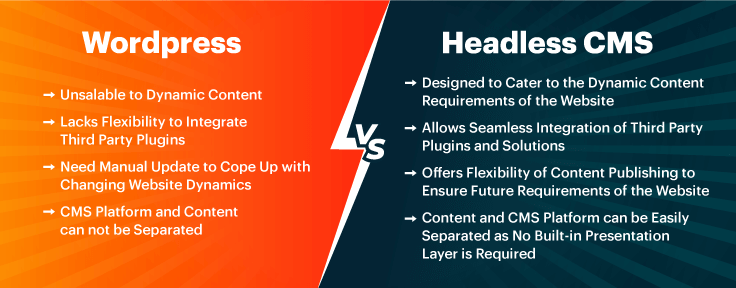Evolution is a continuous process that determines the growth and success of any business. To cope with constantly changing dynamics has become one of the top-most priorities of the organizations irrespective of their domain. Looking at the digital transformation race, companies across the globe have made their digital presence felt with appealing websites and user-friendly mobile applications. But how the management of the websites and apps happens, truly defines the future of a business.
Before getting into the discussion of Headless CMS vs WordPress, let’s look at the long-player of the CMS world and its competitor.
What is WordPress?
WordPress is one of the most popular CMS available in the market today. As per SEO Journal, there are approximately 455 million websites across the world that use WordPress.
Though the CMS has extensive use, due to the changing dynamics of the business world, the websites have become more interactive. Whereas, traditional CMS such as WordPress lack in managing the dynamic content of a website. This is because WordPress for developers allows static content publishing on the website. A business can not use interactive features on its websites on WordPress.
However, several products are available in the market which provides better content management systems to organizations. One such player is Headless content management system software. Now let’s have a look at the WordPress alternatives that are gaining massive momentum in the market.
What is Headless CMS?
A stakeholder of a business might look for answers to the questions such as why Headless CMS? How is it better than the currently popular WordPress CMS? Let’s try to answer some questions to provide a better picture and understand Headless CMS meaning in a better way.
A Headless CMS is a back-end-only content management system that primarily acts as a content repository. What makes Headless CMS stand out from the competition is the ability to access the content via an API for display on any device. This implies that a Headless website can be developed without a built-in front-end or presentation layer.
Since WordPress and Headless CMS’ definitions are now clear, let’s jump back to the discussion of Headless CMS vs WordPress.
To understand the factors that will propel the demand for Headless development, let’s focus on the challenges of WordPress.

Challenges of the WordPress
Limited flexibility for WordPress website builders
Non-technical folks mainly use WordPress. Though there are constant newer WordPress updates, several medium and large-scale organizations have specific requirements that need to be integrated into their website. It can either be CRM integration, localization solutions, e-commerce, or logistic solutions. These solutions and features require specific coding, which is not possible in WordPress. Secondly, the little-to-no-coding of WordPress does not happen in the WordPress platform. Instead, it is done in plain PHP and database. This low-level coding makes maintenance harder for the developers, and they have to work more from scratch.
Limited content authoring
WordPress offers various themes and plugins that might make a website appealing. However, these plugins and themes are stock which is provided as a package to the user. Nevertheless, if the package does not cater to the users’ requirements, then they have to code, and as mentioned above, the majority of WordPress users are not coders.
Pricey vendor support
Vendor support for WordPress can be pretty expensive for the business. If an organization chooses not to opt for hosting and support by third parties using open-source wordpress.org, they can opt for commercial wordpress.com. The standard pricing plan starts from as low as US$ 25 per month for a small business, whereas, for larger companies, the prices can shoot up from US $5,000 per month to US $25,000 per month. That said, companies are free to use third-party services, but the quality and pricing might differ from company to company.
These are three significant challenges that daunt businesses while using WordPress. Now, let’s have a look at why Headless CMS is better than WordPress and how it can help organizations overcome these challenges.
Benefits of Headless CMS
Easier, faster and more flexible
As discussed above, WordPress website builders are restricted from using extensive coding. Moreover, they also find it difficult to integrate custom solutions with the website on WordPress. However, Headless content management system software allows the developers to use custom codes and provides the flexibility of choosing programming languages. Moreover, the Headless CMS is API-driven, allowing developers to build the “head,” i.e., presentation layer/front-end end-to-end. The WordPress alternative also gives developers the freedom of coding without restricting themselves from proprietary development constraints.
Supports Omnichannel Architecture
Omnichannel presence is something that every business invests heavily in. However, the task of achieving this presence can be pretty challenging for organizations. This is because companies need to have content relevant, appealing, and must shine across all touchpoints. Rather than managing each channel separately, Headless CMS allows the businesses to orchestrate a seamless experience that spans all touchpoints, maintaining consistency and relevance.
A future-proof CMS
A headless CMS allows organizations and headless clients to future-proof their applications by separating the presentation layer from the data and logic layer. It will enable them to structure the content to make new projects easier for future-proofing as well as when re-branding on one or more channels, there are no technical changes required within the CMS.
Better software architecture can be achieved with Headless CMS
With the help of Headless CMS, organizations can achieve better software architecture. The WordPress alternative allows businesses to separate CMS platforms and published content. This results in better security, scalability, and availability of the CMS platform, paving the road for successful Headless architecture.
Looking at the demand for Headless CMS there are a number of players in the market that offer the best Headless CMS to clients. Some of them are – Butter CMS, Agility CMS, Contentful, and GraphCMS.
Conclusion
WordPress has been the center stone for the success of several websites over the years. However, the CMS platform is finding it difficult to cope with the changing dynamics of digital business. Whereas the Headless CMS is designed to offer the users scalability and flexibility to cater to the dynamic demands of the content used in the website. It is therefore likely to say that Headless CMS will replace WordPress in the coming future.









